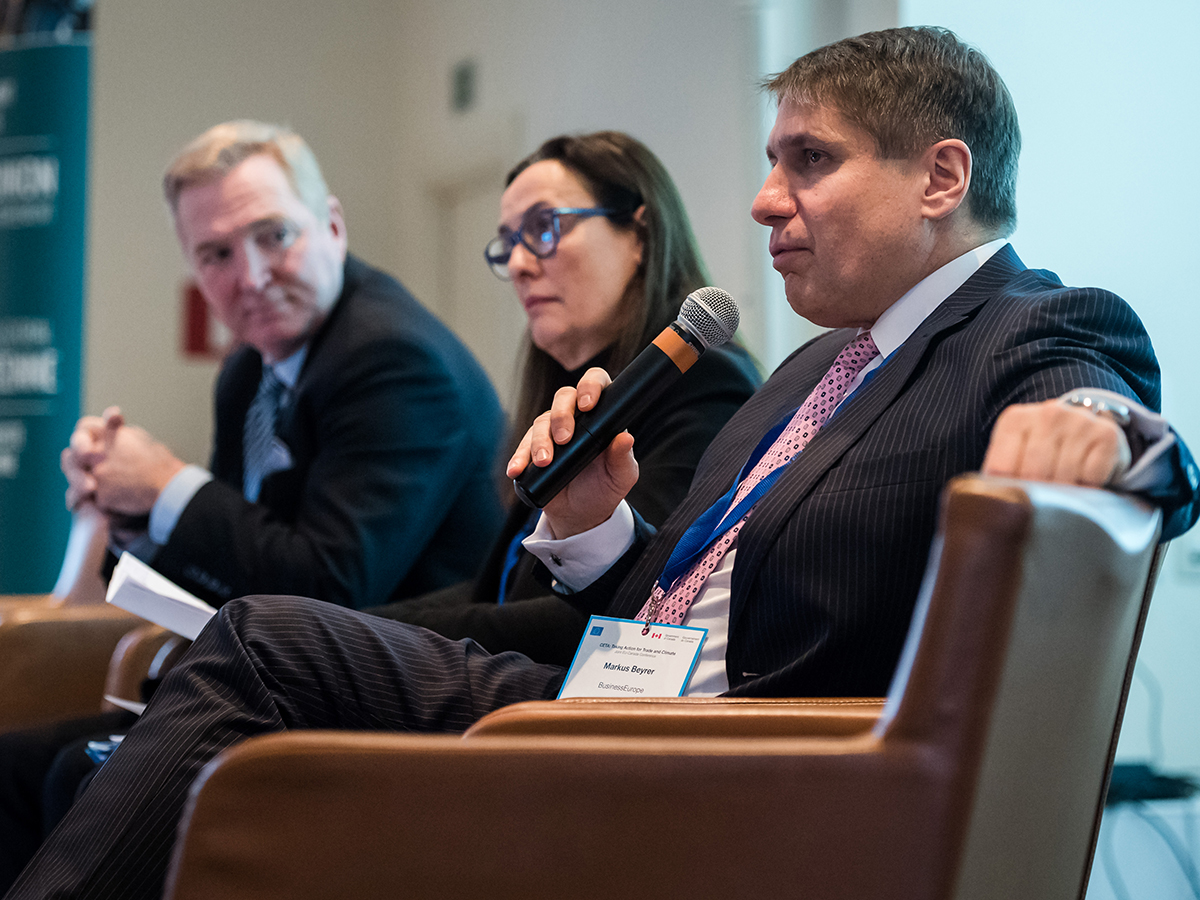BusinessEurope Headlines No. 2019-02
CETA creates new opportunities to promote trade in green tech

“By eliminating tariffs on green tech and boosting collaborative research, the EU-Canada Comprehensive Economic and Trade Agreement (CETA) is one of the first free-trade agreements (FTAs) that can clearly demonstrate what is achievable for two major economies that strive for ambitious climate targets while remaining internationally competitive”, said BusinessEurope Director General Markus J. Beyrer at an event focused on discussing the potential of the EU-Canada trade deal in addressing climate change. He made his remarks amidst Mauro Petriccione, Director General of the European Commission Directorate-General for Climate Action, Patricia Fuller, Ambassador of Canada for Climate Change, as well as several speakers of industry and civil society. Beyrer explained that the potential benefits of CETA are also global: “The increased competition and know-how between our companies can help them export zero and low-carbon technologies across the world. CETA can also function as a reference for future FTAs between other countries”, he added.
Picture copyright: 2019 — GIZ
Contact: Leon de Graaf
Video message on a business ambition for Europe 2030
With a view to the European elections 2019, the business community has a strong responsibility to speak up, explain why the European Union is so important for people’s future and say what needs to be done to ensure that things are going in the right direction. In this video, BusinessEurope President Pierre Gattaz talks about the business ambition for Europe for 2030: a Europe with opportunities for all.
Our comment
Bringing company law into the 21st century
By Pedro Oliveira, Director for Legal Affairs
 The EU is currently taking important steps to modernise EU company law so it better responds to the challenges of an increasingly competitive world where digitalisation became an irreversible process covering many central dimensions of people’s and companies’ lives.
The EU is currently taking important steps to modernise EU company law so it better responds to the challenges of an increasingly competitive world where digitalisation became an irreversible process covering many central dimensions of people’s and companies’ lives.
Despite substantial progress in the EU legal framework, companies still find it difficult to conduct business in another Member State for reasons related to, for example, registration of a new company, registration of changes in a company, creation of subsidiaries, or transfer of a company’s seat. Depending on the Member State it can take from 2.5 to 30 days from the moment you register a company to be able to start your activity. In more than a third of Member States, entrepreneurs still need to physically go to a registry or a notary to perform certain company operations. This is costly, time consuming and impractical.
For many years, BusinessEurope has consistently asked for EU tools that would help companies perform essential corporate operations in a cost-effective manner and to allow companies to expand in the internal market (whether by setting subsidiaries, merging or dividing) in a clear and legal certain way. In 2016, BusinessEurope adopted a paper on digitalisation proposing ideas to fulfil these objectives which anticipated a European Commission consultation later on followed by the EU Company Law Package (April 2018) which tries to respond to the above mentioned challenges.
BusinessEurope welcomed the proposal seeing it as an opportunity to finally bring EU company law into the 21st century. It has produced detailed comments, organised events and promotional videos to make decision-makers aware of the importance of such initiatives for companies and to get the balance right. Of course, all the necessary technical and identity checks need to be there to make sure we create trust around the procedures. At the same time, protecting the interests of owners, business partners and workers of the company remains a must.
We are reaching the final stages of the legislative process. BusinessEurope continues to play an (acknowledged) active and constructive role to bring these proposals into the finish line. Our objective is two-fold: ensure the part focusing on digital tools is quickly adopted, and ensure that the mobility rules are seen not as a way to limit the freedom of establishment but how to exercise it in a clearer and safer way with benefits for all (companies, shareholders, creditors and workers).
Although not part of the Company Law Package, BusinessEurope also welcomed the now agreed directive on insolvency and second chance. In Europe, 50% of new businesses go bust within the first five years at the expense of 1.7 million jobs losses a year in the EU. BusinessEurope strongly supported the Commission proposal which will be a step in the right direction. It makes sure there is access in every Member State to alert systems (to detect problems) and to restructuring procedures. Insolvent honest entrepreneurs are also given legal ability to start over after fulfilling certain conditions.
Article initially written for the SEV-Hellenic Federation of Enterprises’s Regulatory Affairs Newsletter
Contact: Pedro Oliveira
Coordinated artificial intelligence roll-out
 Artificial Intelligence (AI) is being described as a technology to solve all. But while offering solutions to Europe’s greatest problems, Europe itself has some challenges to overcome in order to ensure AI’s successful roll-out. BusinessEurope Internal Market Director, Martynas Barysas, and Digital Economy Adviser, Patrick Grant, explained more to a Competitiveness Council Working Party on 18 January. Barysas explained: “The roll-out of AI in Europe will rely on the success of all policy areas, from labour to energy, not just digital. Holistic policy making is paramount”. As the global race to AI begins Europe looks to coordinate Member States through its Communication “AI Made in Europe”. Grant added: “While the GDPR and Cybersecurity Act offer wins through promoting user transparency and security in AI; the ePrivacy and platform to business discussions progress towards limiting the workability and investment in AI”. Over relying on consent as the main basis to process data or not protecting trade secrets in ranking technologies will harm the full benefits AI offers to citizens. As BusinessEurope continues to promote responsible AI roll-out through aiding the drafting EU ethical Guidelines in the European Commission High-Level Expert Group on AI, we also highlight the importance of realising that other policy areas will also impact its success. We support Member States in developing full national strategies and investment priorities in such crucial areas to that effect.
Artificial Intelligence (AI) is being described as a technology to solve all. But while offering solutions to Europe’s greatest problems, Europe itself has some challenges to overcome in order to ensure AI’s successful roll-out. BusinessEurope Internal Market Director, Martynas Barysas, and Digital Economy Adviser, Patrick Grant, explained more to a Competitiveness Council Working Party on 18 January. Barysas explained: “The roll-out of AI in Europe will rely on the success of all policy areas, from labour to energy, not just digital. Holistic policy making is paramount”. As the global race to AI begins Europe looks to coordinate Member States through its Communication “AI Made in Europe”. Grant added: “While the GDPR and Cybersecurity Act offer wins through promoting user transparency and security in AI; the ePrivacy and platform to business discussions progress towards limiting the workability and investment in AI”. Over relying on consent as the main basis to process data or not protecting trade secrets in ranking technologies will harm the full benefits AI offers to citizens. As BusinessEurope continues to promote responsible AI roll-out through aiding the drafting EU ethical Guidelines in the European Commission High-Level Expert Group on AI, we also highlight the importance of realising that other policy areas will also impact its success. We support Member States in developing full national strategies and investment priorities in such crucial areas to that effect.
Contact: Patrick Grant
Harmonisation does not automatically translate into efficiency
 Martynas Barysas, Director of the Internal Market Department, presented his views on Single Market harmonisation during a public hearing of the European Parliament Committee on the Internal Market and Consumer Protection on 22 January. “Harmonisation in the Single Market has major benefits where it results in less compliance costs and more efficiency, which in turn can be an important driver for growth”, Barysas said, adding that “however, in order for these benefits of Single Market to materialise, harmonisation legislation should remove barriers, provide flexible future-proof frameworks and be consistently enforced”. As examples Barysas referred to the Cybersecurity Act, which removes fragmentation in a new issue area, and the old Product Liability Directive, which provides framework rules and still fits the purpose. “Minimum harmonisation is essentially legalising fragmentation and is to be avoided”, Barysas said. You can watch his speech here and read BusinessEurope’s Single Market strategy paper here.
Martynas Barysas, Director of the Internal Market Department, presented his views on Single Market harmonisation during a public hearing of the European Parliament Committee on the Internal Market and Consumer Protection on 22 January. “Harmonisation in the Single Market has major benefits where it results in less compliance costs and more efficiency, which in turn can be an important driver for growth”, Barysas said, adding that “however, in order for these benefits of Single Market to materialise, harmonisation legislation should remove barriers, provide flexible future-proof frameworks and be consistently enforced”. As examples Barysas referred to the Cybersecurity Act, which removes fragmentation in a new issue area, and the old Product Liability Directive, which provides framework rules and still fits the purpose. “Minimum harmonisation is essentially legalising fragmentation and is to be avoided”, Barysas said. You can watch his speech here and read BusinessEurope’s Single Market strategy paper here.
![]() Contact: Martynas Barysas
Contact: Martynas Barysas
Concerns ahead of EP vote on modernisation of consumer law
 Ahead of the European Parliament Committee on the Internal Market and Consumer Protection (IMCO) vote on the proposal for modernisation of consumer rules (the “Omnibus” proposal), BusinessEurope, together with 10 other business organisations, sent a joint-letter to Members of the European Parliament (MEPs) setting out their main concerns on the proposal. The letter recalled that a European Commission report from 2017 demonstrated that EU consumer rules are generally fit for purpose. Against this background, the business community urged MEPs to keep to the original scope of the Commission’s proposal. Otherwise the new rules could hinder the Digital Single Market, one of the priorities for this legislature. In addition, the co-signatories stressed that merely increasing fines’ levels will not automatically improve enforcement as there is no correlation between high fines and a high level of compliance and consumer trust. Finally, we regret that MEPs will miss this opportunity to rebalance the rules on withdrawal from contracts also to align it with other declared EU goals for sustainability and circular economy.
Ahead of the European Parliament Committee on the Internal Market and Consumer Protection (IMCO) vote on the proposal for modernisation of consumer rules (the “Omnibus” proposal), BusinessEurope, together with 10 other business organisations, sent a joint-letter to Members of the European Parliament (MEPs) setting out their main concerns on the proposal. The letter recalled that a European Commission report from 2017 demonstrated that EU consumer rules are generally fit for purpose. Against this background, the business community urged MEPs to keep to the original scope of the Commission’s proposal. Otherwise the new rules could hinder the Digital Single Market, one of the priorities for this legislature. In addition, the co-signatories stressed that merely increasing fines’ levels will not automatically improve enforcement as there is no correlation between high fines and a high level of compliance and consumer trust. Finally, we regret that MEPs will miss this opportunity to rebalance the rules on withdrawal from contracts also to align it with other declared EU goals for sustainability and circular economy.
![]() Contact: Pedro Oliveira
Contact: Pedro Oliveira
Calendar
- 1 February: EU – Japan free trade agreement entry into force
- 6 February: Conference “Promoting and reinforcing the EU Social Dialogue”
- 5-6 February: EU Industry Days 2019
- 19 February: BusinessEurope conference: What do SMEs expect from the future EU SME policy?
Reminder: please take a look at our revised privacy policy